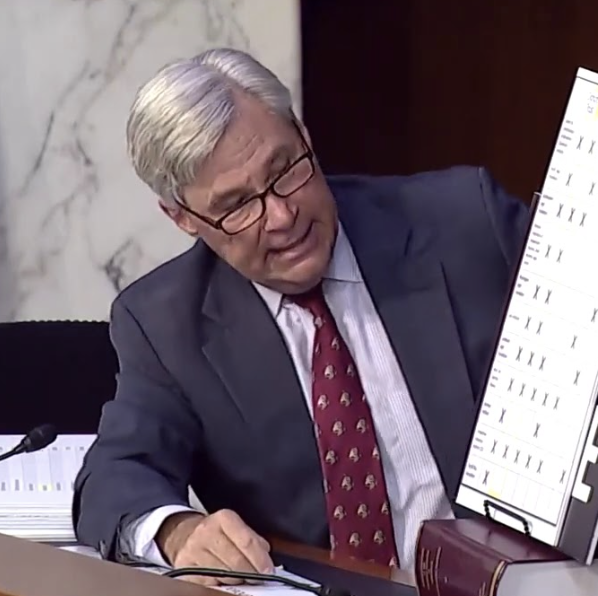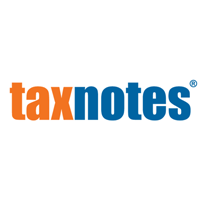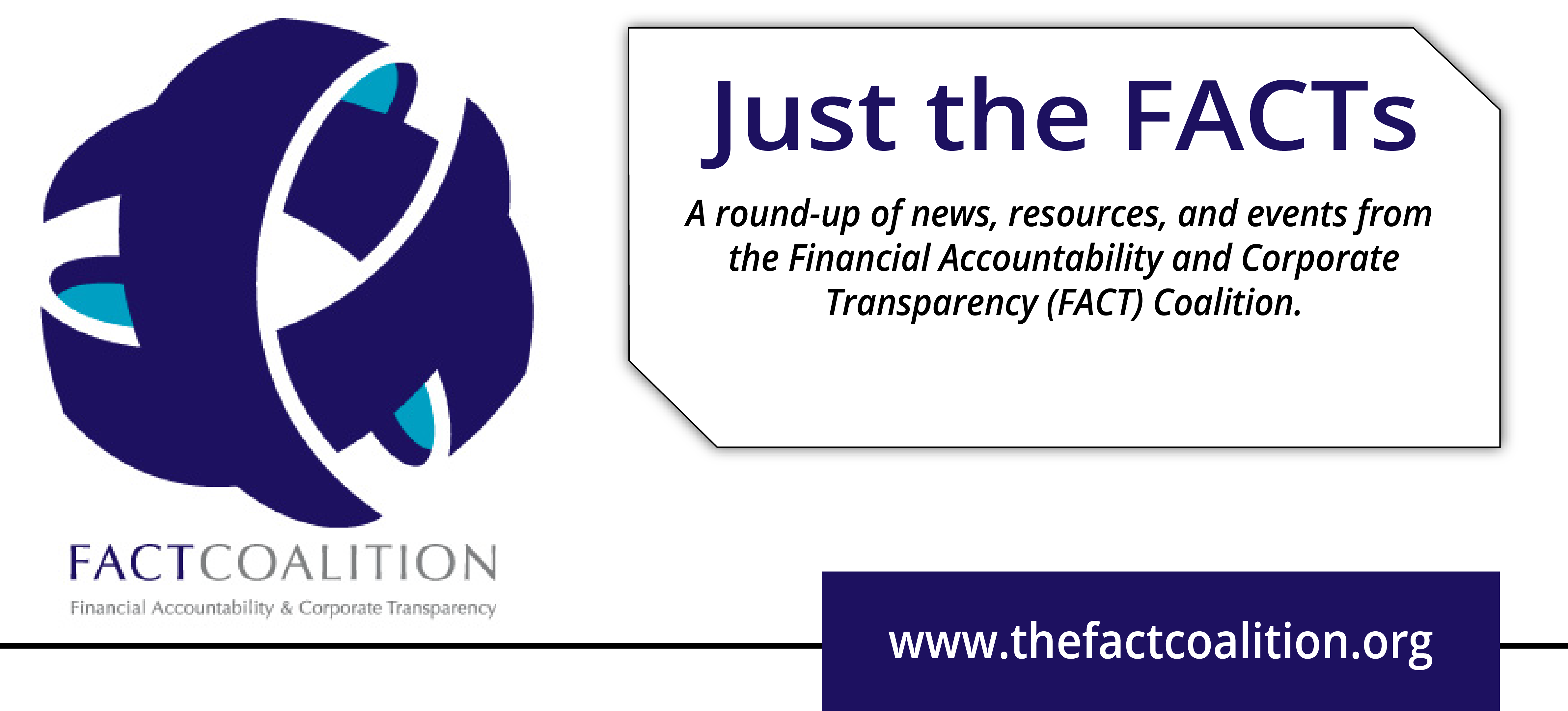“Just the FACTs” is a round-up of news stories and information regarding efforts to combat corrupt financial practices, including offshore tax haven abuses, corporate secrecy, and money laundering through the financial system.
Send feedback or items for future newsletters to Patricia Ainembabazi at painembabazi@thefactcoalition.org
Here is the State of Play
Major Weaknesses in Draft Regulation by Treasury Could Seriously Compromise Effectiveness of Landmark Transparency Law

The FACT Coalition submitted comments on Tuesday urging the Treasury Department to directly address weaknesses in a recent draft rule to implement the Corporate Transparency Act (CTA) that, if left in place, could “undermine U.S. national security and global leadership in the fight against corruption.”
Many of FACT’s warnings were echoed by numerous other advocates and professional organizations, including Coalition member Transparency International U.S., long-time government investigator Elise Bean, the National Association of Attorneys General, and the American Bankers Association.
Foremost among FACT’s concerns are: burdensome additional impediments to access to beneficial ownership information collected under the CTA for state, local, and tribal authorities, as well as foreign authorized users; restrictions hampering financial institution access and use of the information that risks undermining current anti-money laundering and countering the financing of terrorism (AML/CFT) responsibilities; a continued failure to require verification of information as required under the statute; and the release in January of draft reporting forms by Treasury’s Financial Crimes Enforcement Network (FinCEN) that functionally make reporting optional with respect to certain beneficial ownership information required by the CTA.
Though the Biden Administration has made the global fight against corruption a centerpiece of its policy agenda, this new threat to the efficacy of the CTA – one of the most substantial anti-money laundering and financial transparency laws in a generation – comes at a time when public perception of America’s anti-corruption efforts is stagnating. It is imperative that Treasury’s final rule, expected in the coming months, faithfully implements the plain language and intent of the CTA by incorporating the improvements suggested in FACT’s comment.
FACT-Sponsored International Tax Reform Bill Reintroduced in House, Senate

On February 9, Senator Sheldon Whitehouse (D-RI) and Congressman Lloyd Doggett (D-TX) reintroduced the bicameral No Tax Breaks For Outsourcing Act (NTBOA), which would remove statutory incentives for large multinationals operating in the U.S. to relocate their profits and material investments overseas.
Previously introduced in the 117th Congress, and endorsed by the FACT Coalition alongside nearly 90 other labor and advocacy groups, the NTBOA requires that the U.S. statutory domestic corporate tax rate of 21% also apply to the offshore profits of U.S. multinational corporations, applied on a country-by-country basis, to end improper incentives that encourage offshore investment and the shifting of highly mobile profits. The NTBOA also finally and completely eliminates a major loophole that allows large multinationals managed and controlled in the U.S. to dodge taxes by claiming to be a foreign company on paper, among other provisions.
The reintroduction of the NTBOA comes at a time when momentum is mounting for international tax reform across the world. The EU has agreed to adopt Pillar Two of the OECD-negotiated international tax deal, which would establish a 15% global corporate minimum tax. Japan, South Korea, Thailand, and the United Kingdom have all signaled their intention to do the same. Though the U.S. has made some progress in this field, including through the inclusion in the Inflation Reduction Act of 2022 of a 15% corporate alternative minimum tax (CAMT), the U.S. remains out of compliance with Pillar Two.
Due to the design of Pillar Two, the U.S. is likely forfeiting large amounts of revenue without gaining any competitive advantage, as other participating countries will have the right to levy taxes that the U.S. is willingly failing to collect. On the other hand, widespread international adoption of the agreement may stem some profit shifting behaviors for certain multinational companies, which could mean that this Administration has delivered additional revenues to the United States by engaging in multilateral efforts to curb abusive multinational tax dodging efforts. The positive impact of these multilateral efforts should not go completely unnoticed in light of other collective action challenges facing global leaders – including those relating to threats to democracy posed by financial secrecy and climate change.
Earlier this month, the OECD released guidance on the treatment of the U.S.’s global intangible low-taxed income (GILTI) regime under Pillar Two. While the Treasury Department welcomed this guidance as “clear and administrable,” the need for guidance of this kind represents a clear acknowledgement that the current GILTI and CAMT regimes are insufficient under the international tax deal. Legislative measures – such as the NTBOA – will be necessary to bring the U.S. closer to full compliance with Pillar Two.
Latest from FACT

Press Release: FACT Coalition Urges Treasury Department To Make Critical Improvements to Draft Regulation to Implement Landmark Corporate Transparency Act
In comments submitted Tuesday to Treasury’s FinCEN, FACT urged the agency to reverse course on a number of harmful, vague, or otherwise counterproductive measures included in a recent draft rule to implement the landmark CTA.
Per FACT executive director Ian Gary: “As currently drafted, this second rule has the potential to unnecessarily complicate access to the beneficial ownership database established under the CTA to a degree that could seriously impact the efficacy of the law as a whole… The language and intent of the CTA are clear: collected beneficial ownership information should be accurate, complete, and useful to authorized users. FinCEN’s second final rule to implement the CTA must reflect that.”

Blog: FACT’s 2023 Springboard for International Tax and Tax Transparency Reforms
FACT policy director Ryan Gurule outlines a roadmap for progress in the coming year on international tax and tax transparency reform in his new two-part blog.
Between widespread adoption of the OECD-negotiated international tax deal’s Pillar Two, to growing investor and jurisdiction-led efforts to implement public country-by-country reporting of tax data for large multinationals, 2023 is shaping up to be a banner year for tax justice and transparency advocates.
FACT in the News

Quoted In: Experts Explain Driving Factors Behind Human Trafficking in the U.S.
FACT executive director Ian Gary was quoted in reporting by the Organized Crime and Corruption Reporting Project on the implications of widespread financial secrecy for the international fight against human trafficking.
“Traffickers and other criminals have many tools,” Gary said, “from the use of anonymous shell entities to hide their true identities, to investments in underregulated sectors of the economy like real estate, private equity, and cryptocurrency markets – with which to hide and wash the proceeds of their crimes.”

Quoted In: FATCA Shortfalls BringCalls for Elimination, Better Enforcement
FACT policy director Ryan Gurule outlined the case for increased IRS funding in reporting by Tax Notes on the evident underperformance of the U.S. Foreign Account Tax Compliance Act (FATCA), noting that a lack of funds “has hampered the IRS’s ability to invest in technology and staff that can ensure the robust implementation of FATCA.”
Recent and Upcoming Events


February 9: FACT Coalition 2023 Strategic Retreat
Over 50 allies and advocates convened in Washington last Thursday for a day of planning, collaboration, and agenda-setting for the coming year at FACT’s 2023 Strategic Retreat. It was fantastic to see so many members of the community – many of them joining for the first time – able to make it out!

February 8: DC Forum
Just the day before FACT’s Strategic Retreat, the GFI-hosted DC Forum brought anti-corruption, national security, and financial transparency professionals and advocates together for a full day, mixed format conference covering a broad spectrum of issues related to pervasive financial secrecy and its effects.
During the conference, FACT executive director Ian Gary joined Transparency International U.S.’s Gary Kalman, Wayne Law’s Elise Bean, and other veteran financial transparency experts for a policy panel in which Gary raised the importance of public country-by-country reporting to exposing patterns of tax-dodging.

March 15 – 17: Pan-African Network Conference on Fighting Illicit Financial Flows in Africa Theme: From Words to Actions
The African Union’s upcoming conference aims to inform international and regional audiences about various anti-IFF initiatives intended to curb the flight of resources from the African continent, promote sustainable development, and encourage economic growth.

March 20: Comments Due – Forms for Submitting Beneficial Ownership Information
FinCEN is soliciting feedback on the forms that reporting companies will use to submit their beneficial ownership information to FinCEN, in accordance with the first final rule implementing the Corporate Transparency Act. Comments are due March 20.

March 29-30: Second Summit for Democracy
The mixed-format Second Summit for Democracy will bring together government, civil society, and private sector leaders from around the globe to reflect on progress made during the past “year of action,” and to establish new anti-corruption, pro-democracy, and accountability commitments.
About the FACT Coalition

